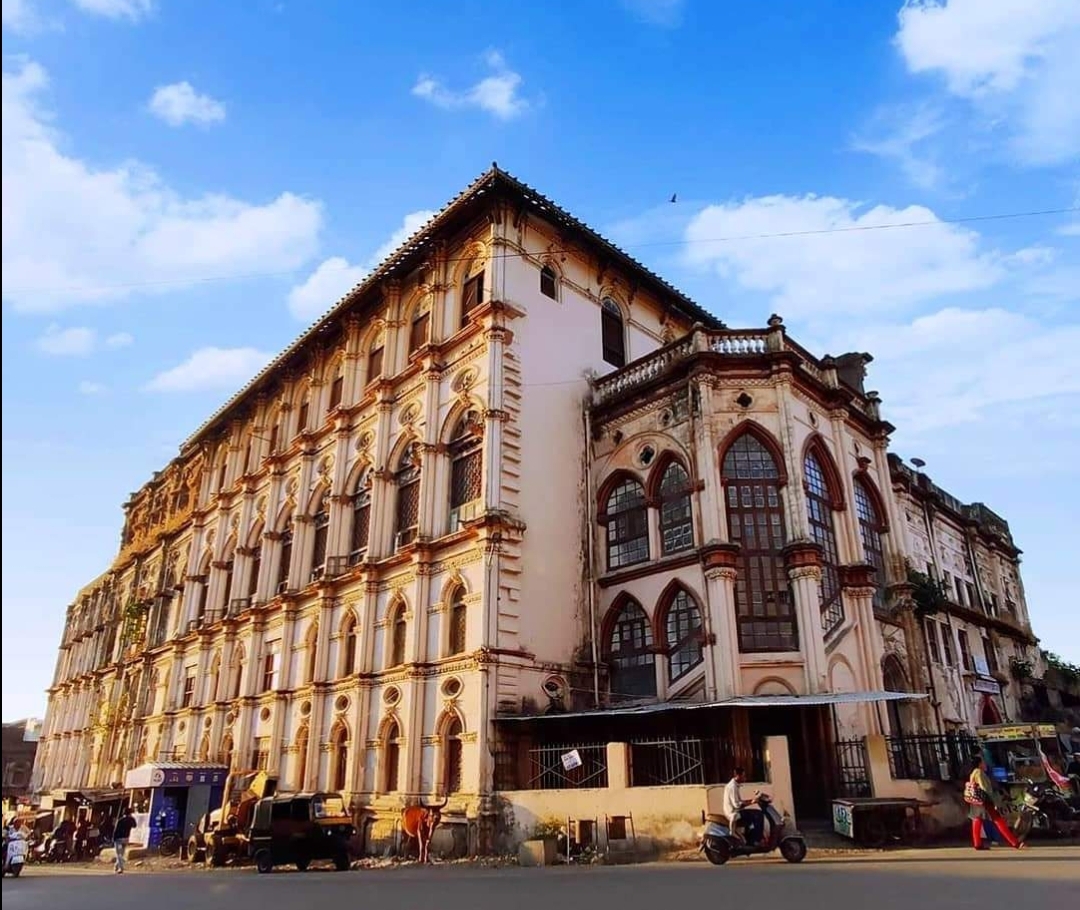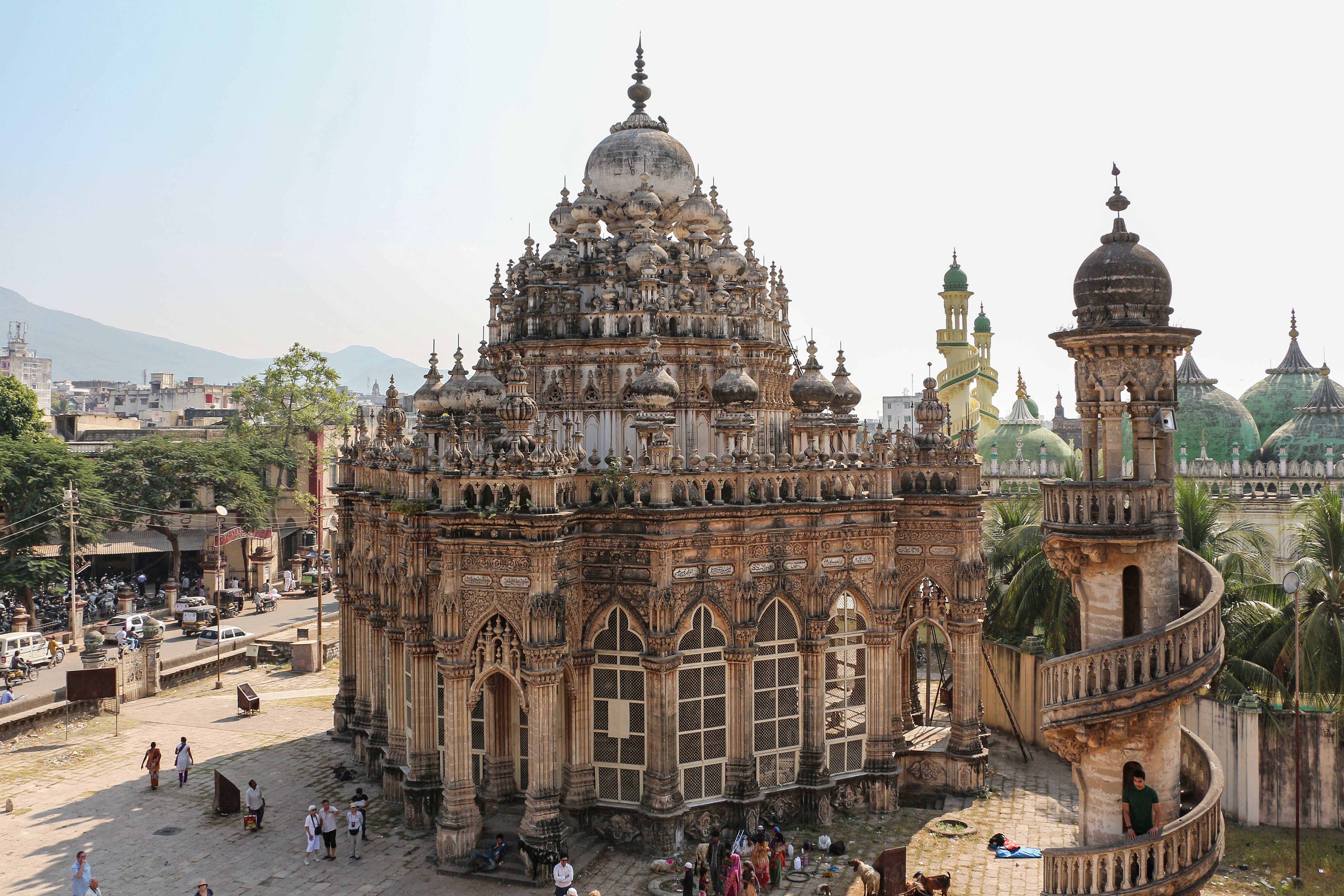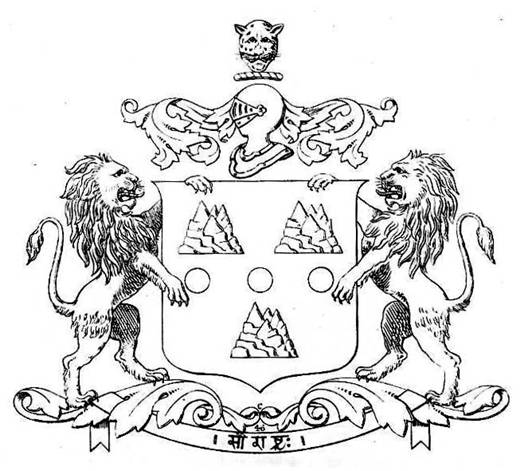Junagadh State on:
[Wikipedia]
[Google]
[Amazon]
 The State of Junagadh or Junagarh was a princely state located in
The State of Junagadh or Junagarh was a princely state located in
 The state of Junagadh was established by the Maharaja of Parmar
The state of Junagadh was established by the Maharaja of Parmar
 The
The
Junagadh Nawab's and state officials, 19th century.jpg, Junagarh Nawabs and state officials, 19th century
Mahabat Khan, the Nawab of Junagarh, 1870s.jpg, Mohammad Mahabat Khanji II, the Nawab of Junagarh, with young, Mohammad Bahadur Khanji III, 1870s
Bahadur Khanji III, Nawab of Junagadh, and state officials, 1880s.jpg, Bahadur Khanji II (r. 1882–1892), Nawab of Junagarh, and state officials, 1880s
Mohammad Rasul Khanji, Nawab of Junagadh, Bahaduddinbhai Hasainbhai, Wazier, Junagadh, 1890s.jpg, Mohammad Rasul Khanji, Nawab of Junagarh, Bahaduddinbhai Hasainbhai, Wazier, Junagarh, 1890s
 There was a Koli rebellion in Junagarh by Mansa Khant during the reign of
There was a Koli rebellion in Junagarh by Mansa Khant during the reign of
Pakistan, India and mapping the contested accession of South Asia’s princely states
University of Nottingham, 3 October 2019. On 10 December 2020, Sultan Ahmed Ali took oath as the Dewan of Junagadh State. This title was Given by Nawab Muhammad Jahangir Khanji who claim
Classic Gallery of Indian Numismatics
{{coord, 21.52, N, 70.47, E, region:IN_type:landmark_source:kolossus-svwiki, display=title 1730 establishments in India 1948 disestablishments in India Bombay Presidency Former protectorates Historical Indian regions States under the Kathiawar Agency Pashtun dynasties States and territories disestablished in 1948 Gun salute princely states Princely states of Pakistan
Gujarat
Gujarat () is a States of India, state along the Western India, western coast of India. Its coastline of about is the longest in the country, most of which lies on the Kathiawar peninsula. Gujarat is the List of states and union territories ...
, It was ruled by the Muslim Babi dynasty since 1654 by first Nawab of Junagadh even within the Maratha Confederacy
The Maratha Empire, also referred to as the Maratha Confederacy, was an early modern polity in the Indian subcontinent. It comprised the realms of the Peshwa and four major independent Maratha states under the nominal leadership of the former.
...
and later British India
The provinces of India, earlier presidencies of British India and still earlier, presidency towns, were the administrative divisions of British governance in South Asia. Collectively, they have been called British India. In one form or another ...
. which, after the partition of British India
The partition of India in 1947 was the division of British India into two independent dominion states, the Union of India and Dominion of Pakistan. The Union of India is today the Republic of India, and the Dominion of Pakistan is the Islam ...
, acceded to the Dominion of Pakistan
The Dominion of Pakistan, officially Pakistan, was an independent federal dominion in the British Commonwealth of Nations, which existed from 14 August 1947 to Pakistan Day, 23 March 1956. It was created by the passing of the Indian Independence ...
. Subsequently, the Union of India annexed Junagadh in 1948, legitimized through a plebiscite
A referendum, plebiscite, or ballot measure is a direct vote by the electorate (rather than their representatives) on a proposal, law, or political issue. A referendum may be either binding (resulting in the adoption of a new policy) or adv ...
held the same year. Pakistan claims sovereignty over the erstwhile princely state to this day. Junagarh State Council with S Parmar have been entrusted with the erstwhile princely state of Junagarh.
History
 The state of Junagadh was established by the Maharaja of Parmar
The state of Junagadh was established by the Maharaja of Parmar Rajput
Rājpūt (, from Sanskrit ''rājaputra'' meaning "son of a king"), also called Thākur (), is a large multi-component cluster of castes, kin bodies, and local groups, sharing social status and ideology of genealogical descent originating fro ...
s. Muhammad Sher Khan Babai was the founder of the Babi Pashtun dynasty of Junagarh in 1654. His descendants, the Babi Nawabs of Junagarh, conquered large territories in southern Saurashtra.
However, during the collapse of the Mughal Empire
The Mughal Empire was an Early modern period, early modern empire in South Asia. At its peak, the empire stretched from the outer fringes of the Indus River Basin in the west, northern Afghanistan in the northwest, and Kashmir in the north, to ...
, the Babis became involved in a struggle with the Gaekwad dynasty
Gaekwads (also spelled as Gaikwads, Guicowars, Gaekwars) (IAST: ''Gāyakavāḍa''), a Hindu Maratha (caste), Maratha dynasty of the former Maratha Confederacy, Maratha Empire and its subsequent (erstwhile) princely state of Baroda State, Baroda ...
of the Maratha Empire
The Maratha Empire, also referred to as the Maratha Confederacy, was an early modern India, early modern polity in the Indian subcontinent. It comprised the realms of the Peshwa and four major independent List of Maratha dynasties and states, Ma ...
over control of Gujarat
Gujarat () is a States of India, state along the Western India, western coast of India. Its coastline of about is the longest in the country, most of which lies on the Kathiawar peninsula. Gujarat is the List of states and union territories ...
, during the reign of the local Mohammad Mahabat Khanji I. Mohammad Khan Bahadur Khanji I declared independence from the Mughal governor of Gujarat subah, and founded the state of Junagarh in 1730. This allowed the Babi to retain sovereignty of Junagarh and other princely states. During the reign of his heir Junagarh was a tributary to the Maratha Empire, until it came under British suzerainty in 1807 under Mohammad Hamid Khanji I, following the Second Anglo-Maratha War
Second Anglo-Maratha War (from 1803 –1805) was a large conflict within the Maratha Confederacy, Maratha Empire involving the British East India Company. It resulted in major loss of territory for the Marathas, including regions around Delhi a ...
.
In 1807, Junagarh became a British protectorate and the East India Company
The East India Company (EIC) was an English, and later British, joint-stock company that was founded in 1600 and dissolved in 1874. It was formed to Indian Ocean trade, trade in the Indian Ocean region, initially with the East Indies (South A ...
took control of the state. By 1818, the Saurashtra area, along with other princely states of Kathiawar
Kathiawar (), also known as Saurashtra, is a peninsula in the south-western Gujarat state in India, bordering the Arabian Sea and covering about . It is bounded by the Kutch district in the north, the Gulf of Kutch in the northwest, and by the ...
, were separately administered under the Kathiawar Agency by British India
The provinces of India, earlier presidencies of British India and still earlier, presidency towns, were the administrative divisions of British governance in South Asia. Collectively, they have been called British India. In one form or another ...
.
In 1947, during the partition of India
The partition of India in 1947 was the division of British India into two independent dominion states, the Dominion of India, Union of India and Dominion of Pakistan. The Union of India is today the Republic of India, and the Dominion of Paki ...
, the last Babi dynasty ruler of the state, Muhammad Mahabat Khanji III
Sir Muhammad Mahabat Khanji III Rasul Khanji, (2 August 1898 – 17 November 1959) was the last ruling Nawab of Junagadh of the princely state of Junagadh in India from 1911 to 1948. He was the father of Muhammad Dilawar Khanji – former ...
, decided to accede to the Dominion of Pakistan
The Dominion of Pakistan, officially Pakistan, was an independent federal dominion in the British Commonwealth of Nations, which existed from 14 August 1947 to Pakistan Day, 23 March 1956. It was created by the passing of the Indian Independence ...
but Junagarh was annexed by India which was followed by a plebiscite in which the locals voted to stay with India.
Rulers
 The
The Nawab
Nawab is a royal title indicating a ruler, often of a South Asian state, in many ways comparable to the Western title of Prince. The relationship of a Nawab to the Emperor of India has been compared to that of the Kingdom of Saxony, Kings of ...
s of Junagarh belonged to Pathan Babi or Babai (Pashtun tribe). They were granted a 13 gun salute
A gun salute or cannon salute is the use of a piece of artillery to fire shots, often 21 in number (''21-gun salute''), with the aim of marking an honor or celebrating a joyful event. It is a tradition in many countries around the world.
Histo ...
by the British authorities:
* 1730–1758 : Mohammad Bahadur Khanji I or Mohammad Sher Khan Babai
* 1758–1774: Mohammad Mahabat Khan I
* 1774–1811: Mohammad Hamid Khan I
* 1811–1840: Mohammad Bahadur Khan II
* 1840–1851: Mohammad Hamid Khan II
* 1851–1882: Mohammad Mahabat Khan II
* 1882–1892: Mohammad Bahadur Khan III
* 1892–1911: Mohammad Rasul Khan
* 1911–1948: Mohammad Mahabat Khan III (last ruler before the integration of Junagarh into India)
Koli Rebellion
 There was a Koli rebellion in Junagarh by Mansa Khant during the reign of
There was a Koli rebellion in Junagarh by Mansa Khant during the reign of Nawab
Nawab is a royal title indicating a ruler, often of a South Asian state, in many ways comparable to the Western title of Prince. The relationship of a Nawab to the Emperor of India has been compared to that of the Kingdom of Saxony, Kings of ...
Sher Khan (the first ruler of Junagarh). He revolted against the ongoing Mughal Rule, with Uparkot Fort serving as his centre of operations. He made a series of raids into the surrounding villages and cities. Nawab Sher Khan was unsuccessful in suppressing the rebellion. Mansa Khant occupied Uparkot for 13 months and continued to carry out numerous raids mostly in the countryside. The nawab was assisted by the King of Gondal State, Thakur Sahib Haloji Jadeja
Jadeja ( Gujarati, Sindhi: , or ''Jāṛejā'') is a Samma Rajput clan that inhabits the Indian state of Gujarat and the Tharparkar district of Sindh, Pakistan. They originated from Sammas of Sindh, a pastoral group, and laid a claim on the ...
and Arab Jamadar Sheikh Abdullah Zubeidi in his campaign against the rebellion. The combined forces defeated the Khant, captured Uparkot and crushed the rebellion.
Annexation by India
In 1947, Shah Nawaz Bhutto joined the council of ministers of Nawab Muhammad Mahabat Khan III, and in May became hisdewan
''Dewan'' (also known as ''diwan'', sometimes spelled ''devan'' or ''divan'') designated a powerful government official, minister, or ruler. A ''dewan'' was the head of a state institution of the same name (see Divan). Diwans belonged to the el ...
or prime minister.
With the partition of India
The partition of India in 1947 was the division of British India into two independent dominion states, the Dominion of India, Union of India and Dominion of Pakistan. The Union of India is today the Republic of India, and the Dominion of Paki ...
in 1947, the princely states were left by the British to decide whether to accede to one of the newly independent Union of India or Dominion of Pakistan, or become a separate country.
The Constitutional Advisor to the Nawab, Nabi Baksh, indicated to Lord Mountbatten
Admiral of the Fleet (Royal Navy), Admiral of the Fleet Louis Francis Albert Victor Nicholas Mountbatten, 1st Earl Mountbatten of Burma (born Prince Louis of Battenberg; 25 June 1900 – 27 August 1979), commonly known as Lord Mountbatten, was ...
that he was recommending that Junagarh should join India. However, upon the advice of Dewan Bhutto, on 15 August 1947, the Nawab announced that Junagarh had acceded to Pakistan. On 16 September, the Government of Pakistan accepted the accession.
India sent its military into Junagarh while the Nawab of Junagarh was in Pakistan and captured the State of Junagarh. The Annexation of Junagarh by India led the Nawab Muhammad Mahabat Khan III of Junagarh (of the erstwhile Babi Nawab dynasty of Junagarh) to live in exile in Sindh
Sindh ( ; ; , ; abbr. SD, historically romanized as Sind (caliphal province), Sind or Scinde) is a Administrative units of Pakistan, province of Pakistan. Located in the Geography of Pakistan, southeastern region of the country, Sindh is t ...
, Pakistan.
Pakistan's claim
Pakistan's government has maintained its territorial claim on Junagadh, along with Manavadar and Sir Creek in Gujarat, on its official political maps. Philip JagessarPakistan, India and mapping the contested accession of South Asia’s princely states
University of Nottingham, 3 October 2019. On 10 December 2020, Sultan Ahmed Ali took oath as the Dewan of Junagadh State. This title was Given by Nawab Muhammad Jahangir Khanji who claim
Annexation of Junagadh
In February 1948, the princely state of Junagadh State, Junagadh, located in what is now the Indian state of Gujarat, was annexed to the Dominion of India, Union of India after a dispute with the Dominion of Pakistan, regarding its Instrument ...
with Pakistan
Pakistan, officially the Islamic Republic of Pakistan, is a country in South Asia. It is the List of countries and dependencies by population, fifth-most populous country, with a population of over 241.5 million, having the Islam by country# ...
.
List of rulers
Rulers
The rulers were titled 'Maharaja
Maharaja (also spelled Maharajah or Maharaj; ; feminine: Maharani) is a royal title in Indian subcontinent, Indian subcontinent of Sanskrit origin. In modern India and Medieval India, medieval northern India, the title was equivalent to a pri ...
'. They had the right to an 13 gun salute.
Junagarh State Council with S Parmar have been entrusted with the erstwhile princely state of Junagarh.
See also
* Annexation of Junagarh * Manavadar State * V. P. Menon *Political integration of India
Before it gained independence in 1947, India (also called the Indian Empire) was divided into two sets of territories, one under direct British rule (British India), and the other consisting of princely states under the suzerainty of the Briti ...
* Pathans of Gujarat
* Junagadh State Railway
References
External links
*Classic Gallery of Indian Numismatics
{{coord, 21.52, N, 70.47, E, region:IN_type:landmark_source:kolossus-svwiki, display=title 1730 establishments in India 1948 disestablishments in India Bombay Presidency Former protectorates Historical Indian regions States under the Kathiawar Agency Pashtun dynasties States and territories disestablished in 1948 Gun salute princely states Princely states of Pakistan